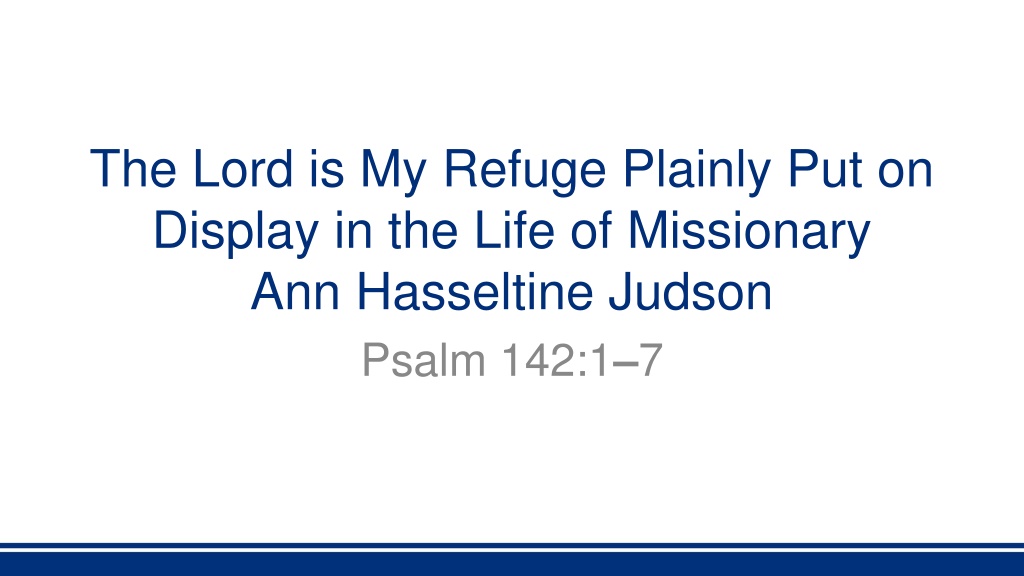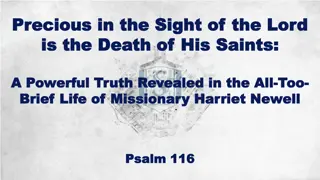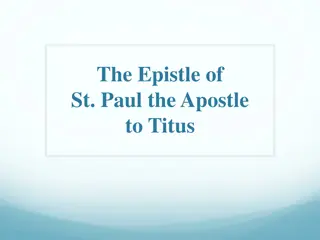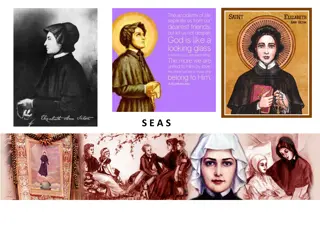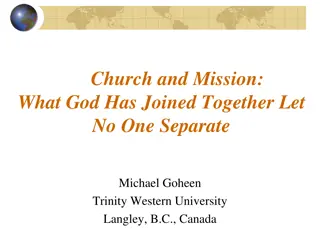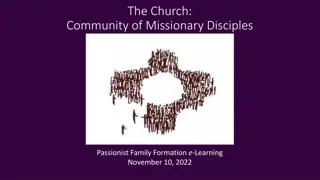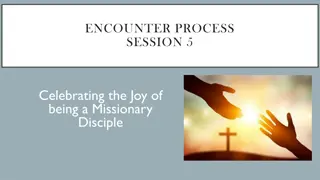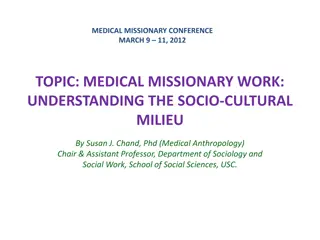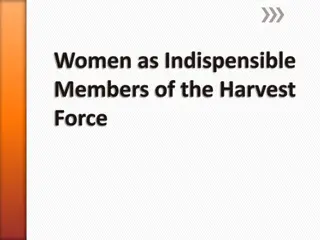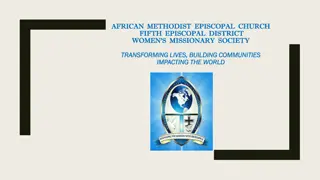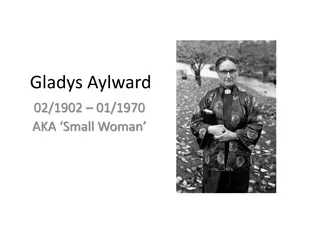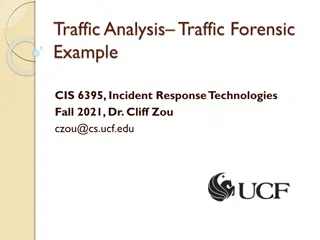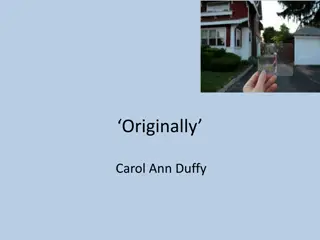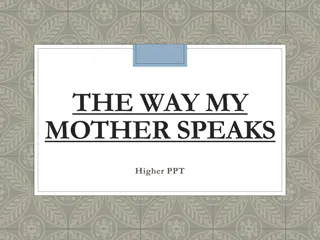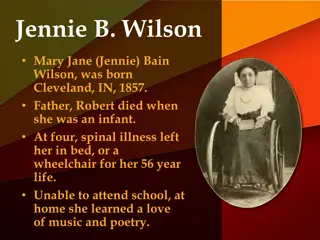The Lord is My Refuge: The Inspiring Life of Missionary Ann Hasseltine Judson
Explore the remarkable journey of missionary Ann Hasseltine Judson, starting from her birth in 1789 to her profound conversion experience and dedication to serving God faithfully. Witness how she found refuge and strength in the Lord throughout her life, exemplifying unwavering faith and commitment.
Download Presentation

Please find below an Image/Link to download the presentation.
The content on the website is provided AS IS for your information and personal use only. It may not be sold, licensed, or shared on other websites without obtaining consent from the author. Download presentation by click this link. If you encounter any issues during the download, it is possible that the publisher has removed the file from their server.
E N D
Presentation Transcript
The Lord is My Refuge Plainly Put on Display in the Life of Missionary Ann Hasseltine Judson Psalm 142:1 7
1. God Hears the Cries of Your Heart (142:1 2)
Ann was born just before Christmas in 1789 in Bradford, Massachusetts. She was the youngest of five children. God used Hannah More s Strictures on the Modern System of Female Education, John Bunyan s Pilgrim s Progress and a visit to an aunt to stir her heart and bring her to Christ at the age of 16.
Journal Entry Describing Her Conversion of my soul, with as much ease as that of my body, I should quickly have done it. But that glorious Being, who is kinder to his creatures than they are to themselves, did not leave me to remain long in this distressing state. I began to discover a beauty in the way of salvation by Christ. He appeared to be just such a Savior as I needed. I saw how God could be just, saving sinners through him. I committed my soul into his hands, and besought him to do with me what seemed good in his sight. When I was thus enabled to commit myself into the hands of Christ, my mind was relieved from that distressing weight which had borne it down for so long a time. . . . I longed for annihilation; and if I could have destroyed the existence
. . . A view of his purity and holiness filled my soul with wonder and admiration. I felt a disposition to commit myself unreservedly into his hands, and leave it with him to save me or cast me off, for I felt I could not be unhappy, while allowed the privilege of contemplating and loving so glorious a Being. I now began to hope, that I had passed from death unto life. When I examined myself, I was constrained to own, that I had feelings and dispositions to which I was formerly an utter stranger. I had sweet communion with the blessed God, from day to day; my heart was drawn out in love to Christians of whatever denomination; the scared Scriptures were sweet to my taste; and such was my thirst for religious knowledge, that I frequently spent a great part of the night in reading religious books. . . .
. . . O how different were my views of myself and of God, from what they were, when I first began to enquire what I should do to be saved! I felt myself to be a poor lost sinner, destitute of everything to recommend myself to the divine favour; that I was, by nature, inclined to every evil way; and that it had been the mere sovereign, restraining mercy of God, not my own goodness, which had kept me from committing the most flagrant crimes. This view of myself humbled me in the dust, melted me into sorrow and contrition for my sins, induced me to lay my soul at the feet of Christ, and plead his merits alone, as the ground of my acceptance.
March 17 [probably 1809] (Age 19) [pioneer missionary to the North American Indians]. It had a tendency to humble me, and excite desires to live as near to God, as that holy man did. Have spent this evening in prayer for quickening grace. Felt my heart enlarged to pray for spiritual blessings for myself, my friends, the church at large, the [lost] world, and the African slaves. Felt a willingness to give myself away to Christ, to be disposed of as he pleases. Here I find safety and comfort. Jesus is my only refuge. Have had some enjoyment in reading the life of David Brainerd
August 8, 1810 (Age 20) according to his pleasure . . . I do feel, that his service is my delight. Might I but be the means of converting a single soul, it would be worth spending all my days to accomplish. Endeavoured to commit myself entirely to God, to be disposed of,
September 10, 1810 opportunity has been presented to me, of spending my days among the [lost], in attempting to persuade them to receive the Gospel. Were I convinced of its being a call from God, and that it would be more pleasing to him, for me to spend my life in this way than in any other, I think I should be willing to relinquish every earthly object, and in full view of dangers and hardships, give myself up to the great work.A consideration of this subject has occasioned much self-examination, to know on what my hopes were founded, and whether my love to Jesus was sufficiently strong to induce me to forsake all for his cause. For several weeks past, my mind has been greatly agitated. An
October 28, 1810 I rejoice, that I am in his hands that he is every where present, and can protect me in one place as well as in another. He has my heart in his hands, and when I am called to face danger, to pass through scenes of terror and distress, he can inspire me with fortitude, and enable me to trust in him, Jesus is faithful; his promises are precious. If I have been deceived in thinking it my duty to go to the [nations], I humbly pray, that I may be undeceived, and prevented from going. But whether I spend my days in India or America, I desire to spend them in the service of God, and be prepared to spend an eternity in his presence. O Jesus, make me live to thee, and I desire no more.
Sabbath (updated) in the path in which thou wouldest have me to go, and it is enough. Blessed Jesus, I am thine forever. Do with me what thou wilt; lead me
2. God Knows What You Are Going Through (142:3 4)
On the way to India, they became convinced of believers baptism and had to forgo all support from the Congregationalist who sent them.
On the way to India, they became convinced of believers baptism and had to forgo all support from the Congregationalist who sent them. They would be denied entry into India and forced to go to Burma, which was extremely hostile to Christianity.
On the way to India, they became convinced of believers baptism and had to forgo all support from the Congregationalist who sent them. They would be denied entry into India and forced to go to Burma, which was extremely hostile to Christianity. Harriett Newell, Ann s dearest friend, would die in childbirth (as would the child) at the tender age of 19, never making it to the mission field.
On the way to India, they became convinced of believers baptism and had to forgo all support from the Congregationalist who sent them. They would be denied entry into India and forced to go to Burma, which was extremely hostile to Christianity. Harriett Newell, Ann s dearest friend, would die in childbirth (as would the child) at the tender age of 19, never making it to the mission field. Ann s first child was stillborn.
On the way to India, they became convinced of believers baptism and had to forgo all support from the Congregationalist who sent them. They would be denied entry into India and forced to go to Burma, which was extremely hostile to Christianity. Harriett Newell, Ann s dearest friend, would die in childbirth (as would the child) at the tender age of 19, never making it to the mission field. Ann s first child was stillborn. Her second child, a boy named Roger, died before his first birthday.
On the way to India, they became convinced of believers baptism and had to forgo all support from the Congregationalist who sent them. They would be denied entry into India and forced to go to Burma, which was extremely hostile to Christianity. Harriett Newell, Ann s dearest friend, would die in childbirth (as would the child) at the tender age of 19, never making it to the mission field. Ann s first child was stillborn. Her second child, a boy named Roger, died before his first birthday. In 1820, after 6 years on the field, Ann nearly died and had to go to Calcutta, and eventually back to America to recover. She would be separated from her beloved husband for 2 years.
When Ann returned to Burma in 1824, she became pregnant. Soon thereafter, Adoniram, and fellow missionary Jonathan Price were imprisoned for 17 months. The conditions were beyond brutal. He nearly died several times and considered suicide. During this period Ann gave birth to a baby girl named Maria, pled repeatedly for her husband s release, and daily walked 2 miles to supply him and others with water and food.
Anns Reflections on Her Husbands Imprisonment till after dark, when I had two miles to walk, in returning to the house. O how many, many times, have I returned from that dreary prison at nine o clock at night, solitary and worn out with fatigue and anxiety . . . My prevailing opinion was, that my husband would suffer violent death; and that I should, of course become a slave, and languish out a miserable though short existence in the tyrannic hands of some unfeeling monster. But the consolations of [Christ], in these trying circumstances, were neither few nor small. It taught me to look beyond this world, to that rest, that peaceful happy rest, where Jesus reigns, and oppression never enters. Sometimes for days and days together, I could not go into the prison,
Our dear little Maria was the greatest sufferer at this time, my illness depriving her of her usual nourishment and neither a nurse nor a drop of milk could be procured in the village. By making presents to the jailers, I obtained leave for Mr. Judson to come out of prison [in fetters] and take the little emaciated creature around the village, to beg a little nourishment from those mothers who had young children. Her cries in the night were heart-rending, when it was impossible to supply her wants. I now began to think the very afflictions of Job had come upon me. When in health I could bear the various trials and vicissitudes, through which I was called to pass. . . .
. . . But to be confined with sickness, and unable to assist those who were so dear to me, when in distress, was almost too much for me to bear: and had it not been for the consolations of [my Lord], and an assured conviction that every additional trial was ordered by infinite love and mercy, I must have sunk under my accumulated suffering.
3. God Will Deliver You as Your Refuge (142:5 7)
AdoniramsLetter to Anns Mother on the Death of Ann and Maria that surrounds her mother s lonely grave. Together they rest in hope, under the hope tree, which stands at the head of the graves, and together, I trust, their spirits are rejoicing after a short separation of precisely six months. And I am left alone in the wide world. My own dear family I have buried; one in Rangoon, and two in Amhurst. What remains for me but to hold myself in readiness to follow the dear departed to that blessed world, Where my best friends, my kindred dwell, Where God my Saviour reigns. The next morning we made [Maria s] last bed in the small enclosure
Ann Judsons Contribution to Missions She modeled joint ministry partnership with her husband. In a letter to her sister in 1812 she wrote, missionary will ever come out her without a wife, as she, in her sphere, can be equally useful with her husband. Good female schools are extremely needed in this country. I hope no
Ann Judsons Contribution to Missions She modeled joint ministry partnership with her husband. In a letter to her sister in 1812 she wrote, missionary will ever come out her without a wife, as she, in her sphere, can be equally useful with her husband. Good female schools are extremely needed in this country. I hope no She was an evangelist, taught women the Gospel, adopted orphans, and started schools for children.
Ann Judsons Contribution to Missions She was a superb linguist and translator who learned spoken Burmese and Siamese better than her husband. She translated the gospel of Matthew, Daniel and Jonah into Burmese, as well as tracts and a catechism.
Ann Judsons Contribution to Missions She was a superb linguist and translator who learned spoken Burmese and Siamese better than her husband. She translated the gospel of Matthew, Daniel and Jonah into Burmese, as well as tracts and a catechism. She wrote a history of their mission work entitled A Particular Relation of the American Baptist Mission to the Burmese Empire. Her plan was to use the proceeds to redeem little girls sold into slavery. It was widely read.
Address to Females in America, Relative to the Situation of [Lost] Females in the East wither in ignorance and delusion, to grope their way to eternal ruin, without an effort on our part, to raise, to refine, to elevate, and to point to that Saviour who has died equally for them as for us? Shall we sit down in indolence and ease, indulge in all the luxuries with which we are surrounded, and which our country so bountifully affords, and leave beings like these, flesh and blood, intellect and feeling, like ourselves, and of our own sex, to perish, to sink into eternal misery? No! . . . Shall we, my beloved friends, suffer minds like these to lie dormant, to
Address to Females in America, Relative to the Situation of [Lost] Females in the East . . . By all the tender feelings of which the female mind is susceptible, by all the privileges and blessings resulting from the cultivation and expansion of the human mind, by our duty to God and our fellow creatures, and by the blood and groans of him who died on Calvary, let us make a united effort; let us call on all, old and young, in the circle of our acquaintance to join us in attempting to meliorate the situation, to instruct, to enlighten and save females in the Eastern world; and though time and circumstances should prove that our united exertions have been ineffectual, we shall escape at death that bitter thought, that Burman females have been lost, without an effort of ours to prevent their ruin.
